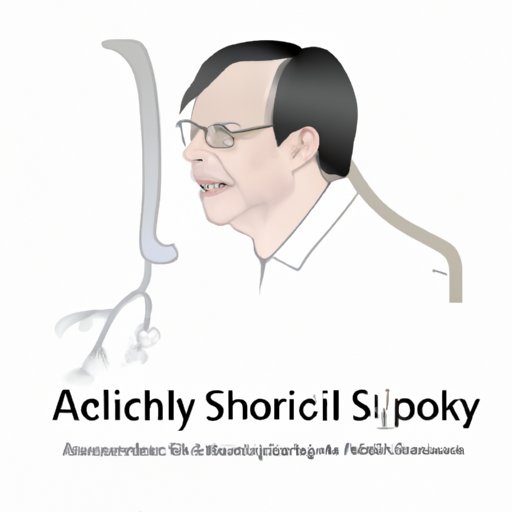
I. Introduction
Stephen Hawking was a world-renowned physicist, cosmologist, and author who is known for his groundbreaking research on black holes and the origins of the universe. Despite suffering from a debilitating disease that left him paralyzed, he continued to work tirelessly and revolutionized our understanding of the universe. In this article, we will explore the disease that affected his life and work, specifically ALS.
II. Stephen Hawking’s Battle with ALS
Stephen Hawking was diagnosed with ALS, also known as Lou Gehrig’s disease, in 1963 at the age of 21. The disease is a progressive neurodegenerative disorder that affects nerve cells that control voluntary muscle movements. As a result of ALS, Stephen Hawking lost motor control and became wheelchair-bound, unable to speak except through a speech-generating device.
Despite these physical limitations, Stephen Hawking remained dedicated to his work and continued to make significant contributions to the fields of physics, cosmology, and mathematics. He also faced numerous challenges in his personal life, including the need for around-the-clock medical assistance and the difficulties communicating with others.
III. The Life and Legacy of Stephen Hawking: Overcoming Disease
Stephen Hawking’s extraordinary life and work were characterized by his perseverance and determination to overcome his disease. He developed a personal philosophy that emphasized the importance of making the most of one’s abilities and living life to the fullest.
Stephen Hawking’s commitment to his work was a testament to his dedication, and his use of technology to overcome his limitations was a marvel of modern ingenuity. Throughout his life, he inspired countless individuals to pursue their dreams and never give up hope, regardless of the challenges they may face.
IV. From Diagnosis to Genius: Stephen Hawking’s Journey with Motor Neuron Disease
The progression of ALS is highly variable and can range from a few years to several decades. In the case of Stephen Hawking, the disease progressed over time, affecting his ability to move, speak, and breathe. He had to undergo numerous medical procedures to extend his life, including a tracheotomy that left him unable to speak without the use of a synthetic voice technology.
The exact causes of ALS are not yet fully understood, but researchers have identified several biological factors that may contribute to the development of the disease. There is currently no known cure for ALS, and treatment options are limited to medications that can help manage symptoms and prolong life expectancy.
V. The Power of the Human Mind: Stephen Hawking’s Success Despite Disease
Despite his severe physical limitations, Stephen Hawking had an exceptional mind and a unique perspective on the universe. He made numerous contributions to the fields of physics, cosmology, and mathematics, and his work had a significant impact on science and society as a whole.
Stephen Hawking’s focus on theoretical physics allowed him to continue to work despite his physical limitations, and he relied heavily on mathematical equations and computer algorithms to communicate his ideas. His work also inspired numerous researchers and scientists to pursue their own research and continue to push the boundaries of our understanding of the universe.
VI. Breaking Down Stephen Hawking’s Rare Disease: What is ALS?
ALS is a rare and devastating disease that affects approximately 20,000 people in the United States alone. The disease attacks nerve cells in the brain and spinal cord, leading to progressive muscle weakness and atrophy. Symptoms of ALS can vary depending on the individual but may include twitching muscles, difficulty speaking or swallowing, and muscle weakness in the limbs or torso.
There is currently no known cure for ALS, but researchers are working tirelessly to find new treatments and therapies that can help manage the disease and extend the lives of those affected. Some current treatment options include medications that can help manage symptoms, as well as physical therapy and assistive devices that can help improve mobility and communication.
VII. Stephen Hawking’s Inspiring Career Despite Health Struggles
Stephen Hawking made numerous contributions to the field of physics throughout his career, including his research on black holes, the big bang theory, and the origins of the universe. He authored several best-selling books that were popular among both scientists and the general public, and he was widely recognized as one of the leading scientific minds of his generation.
Throughout his career, Stephen Hawking received numerous accolades in recognition of his work, including the Albert Einstein Medal, the Presidential Medal of Freedom, and a knighthood in the United Kingdom. He also remained a popular figure in popular culture, with numerous appearances in television shows and movies.
VIII. Science and Society: Honouring Stephen Hawking’s Contributions and Battling Disease
The legacy of Stephen Hawking serves as a powerful reminder of the impact that individuals can have on science and society, even in the face of adversity. His dedication to his work and his determination to overcome his physical limitations are an inspiration to us all.
As we continue to battle diseases like ALS, it is important to recognize the enormous toll they can take on individuals and families. Researchers and medical professionals are working tirelessly to find new treatments and therapies that can help manage these diseases and extend the lives of those affected.
IX. Conclusion
The life and work of Stephen Hawking are a testament to the power of the human spirit and the determination to overcome adversity. Despite his debilitating disease, he continued to make enormous contributions to the field of physics and inspired countless individuals around the world. As we move forward, we must continue to honor his legacy and work towards a world where diseases like ALS are a thing of the past.




